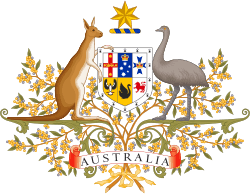Potter v Broken Hill Pty Co Ltd
| Potter v Broken Hill Pty Co Ltd | |
|---|---|
 | |
| Court | High Court of Australia |
| Full case name | Potter v Broken Hill Proprietary Company Limited |
| Decided | 20 March 1906 |
| Citation(s) | (1906) 3 CLR 479, [1906] HCA 88 |
| Court membership | |
| Judge(s) sitting | Griffith CJ, Barton and O'Connor JJ. |
Potter v Broken Hill Pty Co Ltd (1906) 3 CLR 479, was a significant Australian court case, decided in the High Court of Australia on 20 March 1906. The case was an influential decision in Australian Private International Law which is generally regarded as based on an extension of the Moçambique rule to actions for infringement of patents.[1]
Facts
'Potter obtained a patent in Victoria for the separation of metals from sulphide ores and a patent for the same process in New South Wales. Potter claimed that (as well as a threatened infringement of the Victorian patent in Victoria) the defendant company (now BHP Billiton) had infringed the New South Wales patent at its mine in New South Wales. Broken Hill denied novelty and utility, but also said that an action for the infringement in New South Wales of a New South Wales patent was not justiciable in the Victorian courts.'[2]
Judgement
'The question of justiciability was argued as a preliminary matter before the Full Court of the Supreme Court of Victoria, which decided by a majority that the claim was not justiciable, and an appeal to the High Court of Australia was dismissed.'[3]
In a key statement affirming the application of the Moçambique rule, Griffith CJ stated:
| “ | It is settled law that an English Court cannot entertain a suit in which the question of title to foreign land is directly in controversy: British South Africa Co v Companhia de Moçambique.[4] The Courts will no doubt entertain such a question of title if it arises merely incidentally in a case in which the foundation of the jurisdiction is a personal obligation arising from contract or quasi-contractual relationship between the parties.[5] | ” |
He further went on to say:
| “ | In my opinion the same rule must be applied to foreign patents that is applied to foreign lands. The reasons upon which the rule in the one case are founded are, I think, equally applicable to the other.[6] | ” |
'As already mentioned, the decision is generally regarded as based on the Moçambique rule. Although the Moçambique rule is one of the elements in the conclusion of the High Court, an examination of the way in which the case was argued, and of the reasoning of the High Court, shows that it is a decision extending the act of state doctrine to foreign patents.'[7]
Judicial consideration
Australia
In 2002 the High Court indicated that it would like to reconsider this authority:
| “ | We also would reserve for further consideration in an appropriate case the Moçambique rule[8] and the standing of Potter v Broken Hill Pty Co Ltd.[9][10] | ” |
United Kingdom
'It received no attention in the English case-law until it was mentioned by Lord Wilberforce in Hesperides Hotels Ltd v Aegean Turkish Holidays Ltd [1979] AC 508, 536 as authority for the proposition that the Moçambique rule applied in Australia. It was only from the 1980s that it came to be regarded as a significant authority in the field of transnational intellectual property litigation: Def Lepp Music v Stuart-Brown [1986] RPC 273; Tyburn Productions Ltd v Conan Doyle [1991] Ch 75 (both copyright cases).'[11]
The 2011 United Kingdom Supreme Court decision of Lucasfilm v Ainsworth[12] significantly eroded much of the underpinning of this case and of the Moçambique rule, at least within the UK.[13]
Notes
This case was decided at a time when patents were granted by the several States in Australia, and was subject to the common law rule that each Australian State and Territory is treated as a ‘distinct and separate country or law area.’[14]
See also
Cases referring to this case
- Australia
- Petrotimor Companhia de Petroleos SARL v Commonwealth (2003) 197 ALR 461. (Followed)
- Regie Nationale des Usines Renault SA v Zhang (2002) 210 CLR 491. (Cited)
- Nudd v Taylor [2000] QSC 344. (Cited) As authority for the application of the Moçambique rule to foreign immovables being accepted into Australia.[15]
- Dagi v Broken Hill Proprietary Company Limited (No 2) [1997] 1 VR 428. (Applied)
- Inglis v Commonwealth Trading Bank (1972) 20 FLR 30. (Applied)
- United Kingdom
- Lucasfilm v Ainsworth [2011] UKSC 39. (Distinguished)
- Hesperides Hotels Ltd v Muftizade [1979] AC 508. (Cited)
- Hesperides Hotels Ltd v Aegean Turkish Holidays Ltd [1978] QB 205; [1978] 1 All ER 277.
Cases considered by this case
References
- ↑ Lucasfilm v Ainsworth [2011] UKSC 39, [60].
- ↑ Lucasfilm v Ainsworth [2011] UKSC 39, [60].
- ↑ Lucasfilm v Ainsworth [2011] UKSC 39, [60].
- ↑ [1893] AC 602.
- ↑ Potter v Broken Hill Proprietary Company Ltd (1906) 3 CLR 479, 498-499.
- ↑ Potter v Broken Hill Proprietary Company Ltd (1906) 3 CLR 479, 499.
- ↑ Lucasfilm v Ainsworth [2011] UKSC 39, [61].
- ↑ After British South Africa Co v Companhia de Moçambique [1893] AC 602.
- ↑ (1906) 3 CLR 479.
- ↑ Regie Nationale des Usines Renault SA v Zhang (2002) 210 CLR 491, [76].
- ↑ Lucasfilm v Ainsworth [2011] UKSC 39, [68].
- ↑ [2011] UKSC 39.
- ↑ Lucasfilm v Ainsworth [2011] UKSC 39, [105].
- ↑ Laurie v Carroll (1958) 98 CLR 310, 331.
- ↑ Nudd v Taylor [2000] QSC 344, [4].